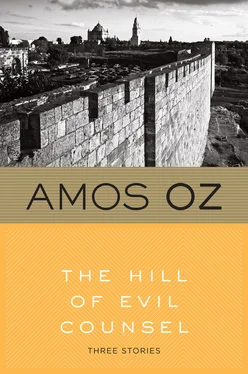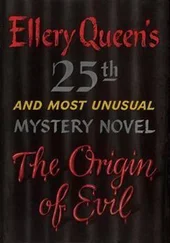And waited.
1974
1
Once upon a time, many years ago, there lived in Jerusalem an old poet by the name of Nehamkin. He had come from Vilna and settled in a low stone house with a tiled roof in a narrow alley off Zephaniah Street. Here he wrote his poems, and here every summer he sat in a deck chair in the garden counting the hours and the days.
This quarter of the city had been built in a large orchard on a hillside, with a view of the mountains that surround Jerusalem. Every passing breeze caused a shiver. Fig trees and mulberry trees, pomegranates and grapevines, were forever rustling and whispering as though asking us to be quiet. The poet Nehamkin was already slightly deaf, but he tried to capture the rustling of the trees in his poems, interpreting it in his own way. The whisper of the leaves in the breeze, the scent of the blossoms, the smell of dry thistles in the late summer, all seemed to him to be hinting at an important event that was imminent. His poems were always full of surmises.
One by one, simple stone-built houses sprang up among the trees of the orchard. They had balconies with rusty iron railings, low fences, and gates adorned with a Star of David or the word ZION.
Little by little the settlers neglected the trees. Shady pines gradually overwhelmed the vines and pomegranates. Occasional bursts of pomegranate blossom were snuffed out by the children before they ever bore fruit. Among the untended trees and the outcrops of rock, there were attempts at planting oleanders, violets, and geraniums. But the flower beds were quickly forgotten, trampled underfoot, filled with thorns and broken glass, and these plants, too, if they did not wither and die, grew wild. In the backyards of the houses, ramshackle sheds proliferated, built out of the packing cases in which the settlers had transported their belongings from Russia and Poland. Some of them nailed empty olive cans to wooden poles, called them dovecotes, and waited for the doves to come. In the meantime, the only birds to nest in the area were crows and swallows. Somewhere there lurked a persistent cuckoo.
The residents longed to leave Jerusalem and settle somewhere less extreme. Some of them fixed their sights on other suburbs, such as Beit ha-Kerem, Talpiyot, or Rehavia. They believed almost without exception that the hard times would soon be over, the Hebrew state would be set up, and everything would change for the better. Surely they had completed in full their term of suffering. Meanwhile, the first children were born and grew up in the neighborhood, and it was almost impossible to explain to them why and from where their parents had come here, and what it was they were waiting for.
The poet Nehamkin lived with his only son, Ephraim, who was an electrician and ideologist. Like most of the children of the district, I, too, believed that this Ephraim played some secret and terrible role in the Hebrew Underground. In outward appearance, he was short, dark, wiry-haired, a technician who almost always wore blue overalls and found it hard to keep his hands still. He repaired irons and radios, and even built transmitters with his own hands. He sometimes disappeared for days on end, to return, eventually, suntanned and withdrawn, with an expression of contempt or disgust on his face, as if in the course of his wanderings he had seen things that had filled him with despair. Ephraim and I shared a secret. At the end of the winter, he had made me his lieutenant. One of his lieutenants, that is.
What it was, however, that he had discovered in his wanderings, Ephraim did not see fit to disclose to me.
Despite his scornful expression, despite his low brow and rough hands, he had various girls who came to him, including a skinny student from the university on Mount Scopus. Sometimes they would stay with him until daybreak. These visitors seemed to me unnecessary; not one of them was pretty or gay. I hated them because they called Ephraim by the ugly pet name Froike, and because I was afraid that love or lust would make him give away to them at night secrets that belonged to the two of us alone; I had sometimes seen in the movies how love can make even heroes lose their wits, and then there is no going back.
Once I helped set a trap with the Grill boys from next door. We tied a rusty tin can full of muddy water to a branch of the mulberry tree, and ran a fine cord from it across the lane. Then we hid in the tree. The skinny girl from Mount Scopus came down the lane, carefully stepped over the cord, cast a reproachful look up into the tree, and remarked sadly:
"You should be ashamed of yourselves."
The Grill boys began to laugh. I laughed with them. Then we put broken glass into some mailboxes.
Later, I felt suddenly ashamed. I felt ashamed for most of the morning, and at lunchtime I went to the workshop and made a clean breast of it to Ephraim. I didn't mention the Grill boys. I took all the blame upon myself. Ephraim locked the door, made me call our trap a stupid, childish prank, and forgave me. He taught me how to fill a tin can with gasoline and use a fuse to ignite it, so that when the time came I could play my part in the final battle and not go as a lamb to the slaughter, like the Jewish children in Europe.
Then Ephraim turned to the dry, dusty-looking girl who was sitting silently on his bed sewing a button on for him, and who seemed to me to have no lips:
"Uriel is in on it," he said. "He's a serious boy. And in general," he added, "there's excellent human material here in the neighborhood. This is Ruhama. And she's not what you think."
Ruhama straightened her glasses with two fingers, still holding the needle. She said nothing. I did not speak, either. Secretly I was convinced that it was this Ruhama who would betray us all to the British police. I thought it strange that Ephraim should be so irresponsible as to have her in his workshop and let her sit on his bed and even stay all night sometimes. Love, I thought to myself, could definitely wait until after the victory. She wasn't even pretty. She didn't even talk to me.
The old poet used to do everything in his power to stop the girls going to the workshop. Sometimes he would lie in wait for them at the gate. But the garden had two entrances, and in places the fence was broken down, and anyway Ephraim's room had a back entrance from the rocky garden, up three stone steps that were slippery with dead pine needles.
Sometimes the poet could not contain himself: he would intercept one of the girls and smile at her with extreme politeness:
"Excuse me, dear lady, but I think you must have made a mistake. I must inform you, with all due respect, that this is neither an alehouse nor a den of thieves. This is a private house. And anyway, the young man is not here, he is away on his travels, he has left no instructions — who am I to say when he will take it into his head to return?"
From the beginning of the summer holidays, there was a secret alliance between Mr. Nehamkin and me against these periodic incursions. He lay in wait in front of the house, while I lurked in the garden.
Ephraim, if he was not away on his wanderings, liked to sleep from after lunch until the evening twilight. He would sleep, soaked in sweat, on a mattress in his workshop. He would toss and groan in his sleep, ward something off with his fists, turn over suddenly with a moan. I would tiptoe in to listen in case he uttered secrets in his dreams, so that I could keep them from prying ears. Then I would tiptoe out again and resume my watch.
If ever one of the girls came to disturb Ephraim's slumbers, we would both, Mr. Nehamkin and I, waylay her at the gate. We were armed with uncompromising replies to the mincing question "Where's Froike?"
Читать дальше











